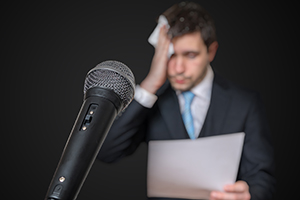
Microphone in front of a nervous man who is afraid of public speech and sweating.
Performance anxiety is real and it happens to the best of us. Commonly known as stage fright, have you ever felt like this? Sweaty palms, dry mouth or shaky legs when faced with an audience or a speech?
The most noted people in Hollywood, sports or on television have suffered over time with stage fright. If you suffer from stage fright, don’t feel alone, since even celebrities get scared speechless. Nicole Kidman recently shared her experience with Screenrant author Richard Banks in an article last month.
Those who have taken a speech class or dealt with being scared speechless are too familiar with the signs. You know the feelings that surface when you are standing in front of your audience. How does a speaker recognize the symptoms and signs of this dreaded fear? They are physical manifestations
Before the Speech Symptoms:
- Constant worry
- Lost sleep
- Quivering hand
Day of Symptoms of Stage Fright
- Excessive sweating
- Queasy stomach
- Heart beating out of your chest
- Quivering hands and/or legs
- Pacing back and forth
- Clearing your throat continuously
- Stuttering and/or loss of voice
If you are nervous or concerned about your speech, it clearly means you care about your audience. The causes for stage fright can be endless and they vary from person to person, but just remember it’s absolutely normal. That’s right, you are not a freak because you are feeling threatened by your upcoming speech. The dread or fear of speaking is an equal opportunity gangster.
Technically the feeling of stage fright can make us feel like we are naked and unprepared in front of a large audience. In fact, it’s a true sense of danger that takes over when faced with an audience, if you don’t seek the truthful solutions.
Truth Solutions- Clearly, there’s no magic wand to fix stage fright. What I can offer are 4 truth tips to help you drop stage fright at the door. Stop the fight or flight urge in its tracks and solve some of the basics. The truth is a speaker that questions how to help his/her audience will succeed. Additionally, connecting with your audience is vital.
- Clear message (no more than 2-3 key points)
- Breathe
- It’s Not About YOU- Focus on the audience
- Silence your inner critic
Messaging 1-2-3
Clarify your messages and trim them to 1,2 or 3 at the most. Period. Using more than 3 key points will cause you stress and confuse your audience. Remember the old old term, “keep it simple, stupid”.
Breathe!
Another way to control stage fright is to take a deep breath and truly let it out slowly. This will relax your mood and create a quick meditative recovery period. A calming technique for feeling more at ease is making your exhale two times as long as your inhale. Try it.
It’s Not About YOU
Focus on your audience and what they would want to hear and you’ll win over your audience hands down. A focus on You will only accentuate the negative and leave more room for failure. A speaker focused too much on him or herself will eventually lose the audience with boredom as well. Don’t be that self absorbed talking head. Show them you care what they want and what will help them.
Silence the Inner Critic
Kick your internal doubting Thomas to the curb. You know the voices that say “what if see me shaking”, “I’ve never been good at public speaking”,
Crazy stage fright tips we’ve all heard:
- Imagine your listeners in their underwear
- Take a deep breath and smile
- Picture your audience smiling
If you’ve heard these and they work, that’s great. Picturing the audience with no clothes or in their skivvies is a common one that anyone can say, but not easy to practice. Trying to breathe and smile is a secret weapon I share with my students. Try all or one and see if any work for you.


